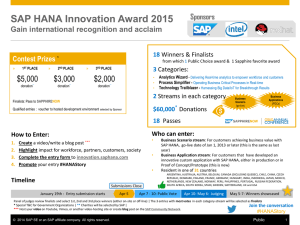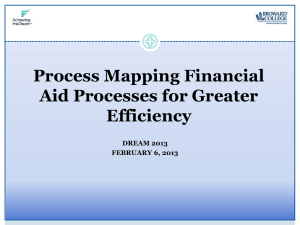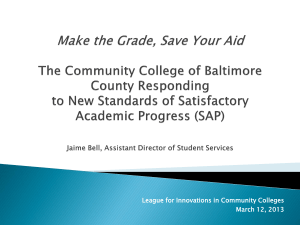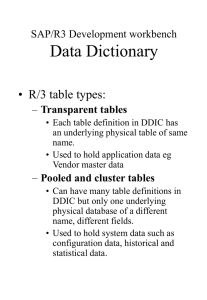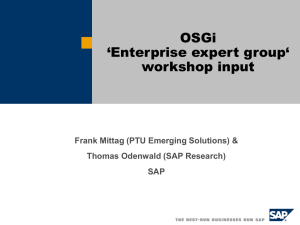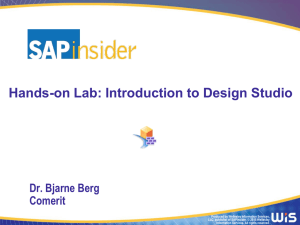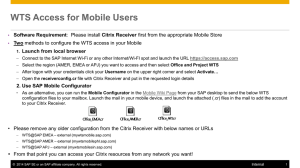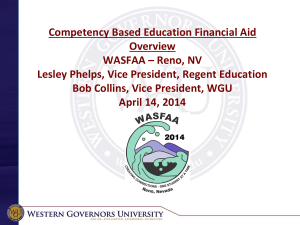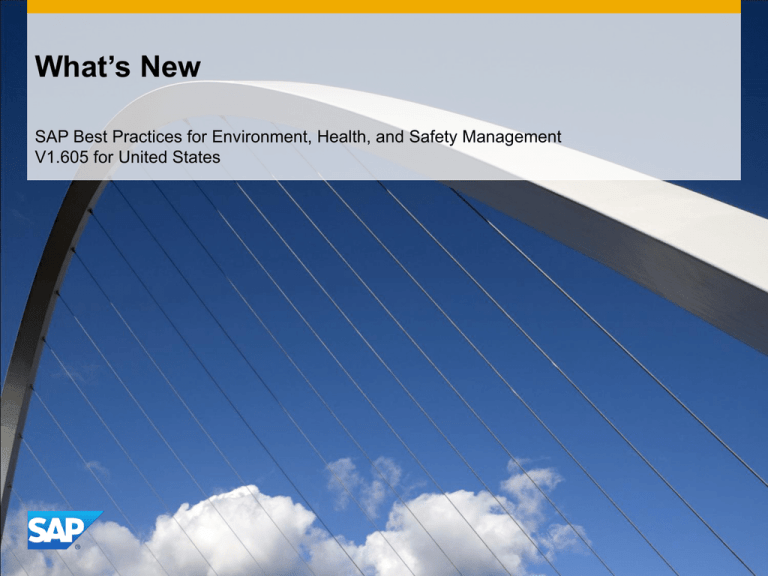
What’s New
SAP Best Practices for Environment, Health, and Safety Management
V1.605 for United States
Short Overview of What’s New
What‘s new
SAP ERP Release related enhancements
Based on SAP ERP enhancement package 5
SAP Best Practices for Environment, Health, and Safety Management for the United
States V1.605 comes with its own data model and was developed for small and midsize
companies to implement a solution quickly and easily. The package can be installed as
stand alone package or along with any other SAP Best Practice Baseline or Industry
Package for the United States.
Functionalities
SAP Best Practices for Environment, Health, and Safety Management supports your
business in the following areas :
Product Safety
Dangerous Goods Management
Industrial Hygiene and Safety
Occupational Health
Product Lifecycle Management (PLM)
Waste Management
Enterprise Management & Support
© 2011 SAP AG. All rights reserved.
2
EHSM Scenarios in the United States V1.603
The following Environment, Health, and Safety Management scenarios were previously
part of the SAP Best Practices for Chemicals Industry package V1.603 :
935: EH&S Product safety
936: EH&S Dangerous Goods Management
937: EH&S Industrial Hygiene and Safety
938: EH&S Waste Management
939: EH&S Business Compliance Services
942: Transformation of General Recipes
944: EH&S Substance Volume Tracking (Sales)
© 2011 SAP AG. All rights reserved.
3
EHSM Scenarios in the United States V1.605
Starting with V1.605, Environment, Health, and Safety Management is an independent
package. It comes with its own generic master data (all scenarios have new master data
as compared to V1603) that can be implemented independently, with the SAP Best
Practices Baseline Package, or another industry solution.
935: EHSM Product safety
This scenario show how to handle Substances safely using a Specification database and
Phrase Management and bring them safely to market, to comply with all relevant
regulations automatically
936: EHSM Dangerous Goods Management
This scenario describes business processes related to Dangerous Goods Management;
for example, how to edit Dangerous goods master records to perform Dangerous Goods
Checks and run them in Sales and Distribution and output them in Output documents
937: EHSM Industrial Hygiene and Safety
This scenario describes business processes related to Industrial Hygiene and Safety, such
as processing to assess the hazards associated in a work place, quantify and compare
the hazards to regulatory guidelines, implement controls (Engineering or Administrative) to
mitigate those hazards, and monitor the controls and generating hazardous substance
register
© 2011 SAP AG. All rights reserved.
4
EHSM Scenarios in the United States
V1.605…..continued
938: EHSM Waste Management
This scenario describes business processes related to legally compliant disposal
processing of waste generated using the Business Partners by setting up of Waste
Profile, Legally Compliant Disposal processing ending with invoice verification and
payment
939:EHSM Business Compliance Services
This scenario describes business processes related to Safety Data Sheets requested
from a Service Provider in order to comply with national and international regulations and
how to import the Regulation specific documentation from a Service provider into system
and integrate it seamlessly into Logistics process
944:EHSM Substance Volume Tracking (Sales)
This scenario describes the business processes related to Substance Volume Tracking Sales. It allows non-European Union companies to find out the substance quantities
exported to European Union Customers in their SAP ERP system and to support their
customers according to the European REACH legislation
© 2011 SAP AG. All rights reserved.
5
EHSM Scenarios in the United States
V1.605…..continued
974: EHSM Recipe Development on PLM Web UI
This scenario covers the development of a product within the development phase (R&D). It describes
how to create a recipe and the corresponding formula for a product. It uses specifications to define the
input items that are linked to the raw materials to be used. It defines the output specification that are
linked to the finished material that is produced. This can be used to describe the production process
(process steps) and also to perform compliance checks to insure the recipe meets regulatory checks.
975:EHSM Occupational Health
Companies have to follow a zero-harm-to-the-workforce approach, which must be realized through
regular examination and testing of employees to ascertain and maintain their health. These
examinations are carried out by an occupational health professional on all employees who will be
exposed to risks in the working environment.
The reporting of statistical injury and occupational illness information is made possible by capturing the
information in the injury/illness log.
990:EHSM Substance Volume Tracking (Purchasing)
This scenario describes the business processes related to Substance Volume Tracking. It allows
companies to find out their effective bandwidths as well as to control them within the procurement
processes in their SAP ERP system according to the US TSCA 8D Regulation
© 2011 SAP AG. All rights reserved.
6
EHSM Scenarios in the United States
V1.605…..continued
991: EHSM Global Label Management
This scenario enable to label the products and bring them onto the market in compliance with the law.
User can manage labels and label-specific data and print labels in various languages for different
labeling scenarios with regulatory symbols and safety information. It is Integrated in other processes
of SAP ERP (for example, goods receipt, make-to-stock production, and delivery) which allows the
system to create legally compliant labels automatically and print the required number of labels
999: EHSM Audit Management
This scenario enables the user to set up and conduct audits. This outlines the process to create and
valuate EHS audits with ability to create and monitor corrective actions.
960: EHSM Activate Document Splitting
This scenario enables you to assign one or more segments (such as cost/profit centers) to financial
postings for current or future managerial reporting needs, and is a prerequisite for Segment Reporting.
© 2011 SAP AG. All rights reserved.
7

